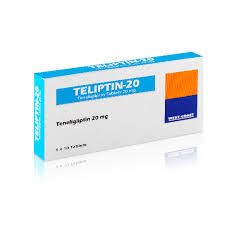Tilyptin, also known as Teneligliptin, is an oral medication primarily used for the management of type 2 diabetes mellitus (T2DM). It belongs to the class of drugs known as dipeptidyl peptidase-4 (DPP-4) inhibitors, which help control blood sugar levels.
Key Features
- Active Ingredient: Each tablet contains 20mg of Teneligliptin.
- Formulation: Typically available in tablet form, often packaged in strips of 10 tablets.
Indications
Tilyptin is indicated for:
- Type 2 Diabetes Mellitus: Used to improve glycemic control in adults when diet and exercise alone are insufficient. It can be used as monotherapy or in combination with other antidiabetic medications.
Mechanism of Action
Tilyptin works by inhibiting the DPP-4 enzyme, which leads to increased levels of incretin hormones. These hormones promote insulin secretion in response to meals and decrease glucagon secretion, resulting in lower blood sugar levels.
Dosage and Administration
- Recommended Dosage: The usual starting dose is 20mg taken once daily. Depending on individual response and glycemic control, the dose may be increased to 40mg per day.
- Administration: Tilyptin can be taken with or without food, but it is recommended to take it consistently at the same time each day for optimal results.
Side Effects
Common side effects may include:
- Headache
- Hypoglycemia (low blood sugar)
- Gastrointestinal issues (nausea, diarrhea)
- Upper respiratory tract infections
- Fatigue
Serious side effects that require immediate medical attention include:
- Severe allergic reactions (e.g., rash, swelling)
- Pancreatitis (severe abdominal pain)
Precautions
- Contraindications: Not recommended for individuals with a known allergy to Teneligliptin or those with type 1 diabetes or diabetic ketoacidosis.
- Monitoring: Regular monitoring of blood glucose levels is essential, especially when used in combination with other antidiabetic agents to avoid hypoglycemia.
- Pregnancy and Breastfeeding: Consult a healthcare provider before use if pregnant or breastfeeding.

